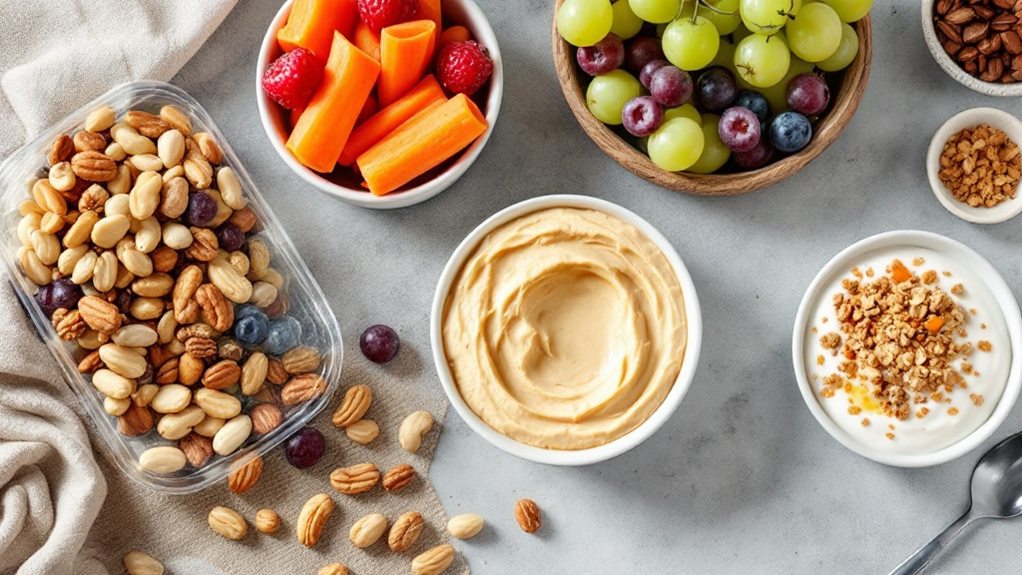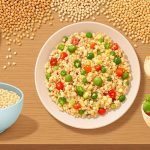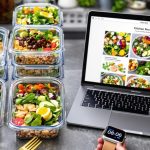As a busy professional, you can maintain a healthy diet by adopting strategic meal planning and smart snacking choices. Start by prepping meals twice a week, batch cooking proteins, whole grains, and vegetables for versatile options. You’ll save time and guarantee healthy options are always available by freezing single-serve portions. Choose nutrient-dense foods like fresh fruits, vegetables, and lean proteins. Keep healthy snacks like fruits, yogurt, and nuts on hand to prevent unhealthy choices. By implementing these habits, you’ll set the stage for a healthier lifestyle, and with a few more tweaks, you’ll be on your way to achieving a balanced diet that fits even the most hectic schedules.
Timesaving Meal Planning
Focus on healthy eating by using the plate method, which emphasizes filling half your plate with vegetables. This not only guarantees balanced meals but also minimizes prep time and maximizes nutrition.
Consider using pre-chopped ingredients or a meal delivery service to save time on grocery shopping and prep work. Fresh produce is essential, so make certain to include a variety of fruits and vegetables in your meal plan.
Batch cooking is another timesaving strategy. By preparing multiple meals in one session, you’ll reduce cooking time over the week and guarantee easy access to healthy options.
When planning your meals, pay attention to portion sizes to maintain a healthy diet. Look for healthy recipes that incorporate a variety of ingredients and can be easily reheated or repurposed.
Healthy Eating Strategies
Building on the concept of efficient meal planning, incorporating healthy eating strategies into your daily routine can greatly enhance your overall well-being, especially for busy professionals.
By focusing on nutrient-dense foods and mindful eating practices, you can boost your energy levels and cognitive function, which are essential for tackling demanding work schedules.
To make healthy eating easier and more efficient, consider the following strategies:
3 Healthy Eating Strategies for Busy Professionals:
1. Prep and Plan Ahead: Create a grocery shopping list based on your meal plans to reduce impulsive eating and shopping.
Incorporate batch cooking and freezing meals in portions to save time during the week. This way, you’ll guarantee healthy options are readily available when schedules become hectic.
2. Choose Nutrient-Dense Foods: Incorporate fresh fruits, vegetables, whole grains, and lean proteins into your meals.
Frozen vegetables can be a convenient and nutritious choice for quick and easy meals. Healthy snacks like nuts, seeds, and whole grain crackers can curb hunger and keep you energized throughout the day.
3. Control Portions and Practice Mindful Eating: Packing lunches allows for better control over ingredients and portion sizes, making it easier to avoid high-calorie fast food options during workdays.
Practice mindful eating by focusing on meals without distractions to improve digestion, enhance satisfaction, and help prevent overeating.
This mindful approach can greatly improve your overall health and well-being, guaranteeing you maintain a healthy lifestyle amidst a hectic schedule.
Smart Snacking Choices

Adopting smart snacking choices is essential for maintaining energy levels and supporting a healthy lifestyle, especially during hectic workdays. By keeping healthy snacks readily available, such as fruits, yogurt, and nuts, you can prevent impulsive unhealthy choices and guarantee better energy levels throughout the day.
This approach also helps in managing calorie intake, as pre-portioning snacks into convenient servings promotes mindful eating habits, making it easier to avoid overindulgence.
Swapping processed snacks like chips for healthier alternatives, such as air-popped popcorn or veggie sticks with hummus, can considerably lower calorie and sodium intake while providing essential nutrients. High-fiber snacks, such as whole grain crackers with nut butter or fresh fruit, are particularly beneficial as they promote satiety and help manage hunger between meals.
This not only supports overall health but also boosts productivity by preventing energy crashes that can occur when consuming high-sugar or high-sodium snacks.
Incorporating a variety of nutritious snacks, including options like hard-boiled eggs and rice cakes, enhances meal flexibility and makes healthy eating more accessible on busy days.
By focusing on whole foods like fruits and vegetables, and combining them with other nutritious elements, you can maintain a balanced diet even when time is limited.
This proactive approach to snacking guarantees that you have the energy and nutrients needed to perform at your best, regardless of your schedule.
Efficient Meal Prep
In a fast-paced professional life, having a well-planned meal prep strategy can make all the difference in maintaining a healthy diet. By dedicating time to meal planning and prepping, you can save time on busy days and guarantee you always have nutritious meals ready.
To make meal prep efficient, consider these key strategies:
- Schedule Regular Prep Sessions: Plan to prep meals twice a week. This helps you stay on track with healthy eating and saves time on busy days. Use these sessions to prepare batches of proteins, whole grains, and vegetables that can be used in various meals[1][2].
- Maximize Efficiency with Overlapping Ingredients: Choose recipes that share ingredients to minimize waste and reduce cooking time. For example, roasting a large batch of vegetables can provide you with ingredients for salads, wraps, and grain bowls[2][4].
- Freeze for Future Meals: Freeze meals in single-serve portions to always have a healthy option available. This helps you avoid takeout when you’re short on time and guarantees you stick to your health goals[2][4].
Mindful Eating Habits

| Eating Style | Mindless Eating | Mindful Eating |
|---|---|---|
| Focus | Multitasking | Focused on food |
| Speed | Eating quickly | Eating slowly |
| Portion | Ignoring fullness | Listening to cues |
| Choices | Habitual or emotional | Thoughtful and nutritious |
By eating slowly, you give your body approximately 20 minutes to signal fullness through hormonal responses, which can lead to reduced overall calorie intake. Starting meals with vegetables encourages their consumption and can also lead to lower calorie intake overall by stabilizing blood sugar levels and promoting healthier choices throughout the meal. Keeping high-calorie dressings and condiments on the side allows for better portion control and helps maintain the nutritional integrity of meals.
Engaging in mindful eating habits, such as savoring flavors and reflecting on food choices, can enhance meal satisfaction and contribute to healthier eating patterns over time. This approach supports maintaining a healthy weight and making better choices about meal planning and cooking at home, including selecting healthy snacks and focusing on the true hunger cues rather than external triggers.
In Summary
Imagine you’re a swift sailboat steering through choppy waters, with your diet being the steady hand at the helm. By charting a course with timesaving meal planning, healthy eating strategies, smart snacking choices, efficient meal prep, and mindful eating habits, you can steer clear of unhealthy pitfalls and reach your wellness destination. Take control of your diet and you’ll find the energy to conquer the busiest of seas. Prioritizing your nutrition transforms you from just afloat to triumphantly sailing the waves of life.














